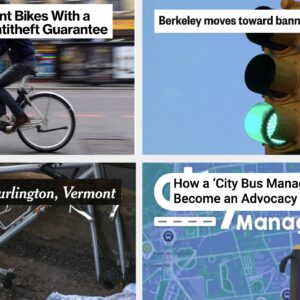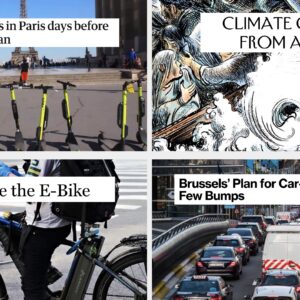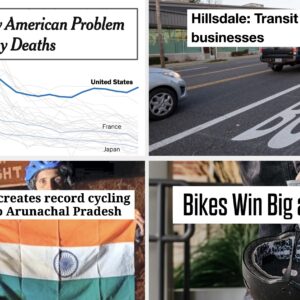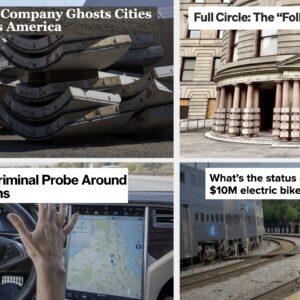Good news, bad news, traffic gossip, and inspiring photos
– If you only click through to one of these stories today, make it this one: Streetsblog manages to make the mechanisms of federal transportation funding fairly understandable, explains why the last federal transportation bill (SAFETEA-LU) is inadequate, and outlines what is needed for the new bill being drafted to make sense. This is about as important as it gets.
– Also on the federal level, Representatives Oberstar and Blumenauer (both of bike caucus fame) are calling for a mileage-based car tax. The White House has shot down the idea, but the idea seems to be picking up steam.
– Several European cities have announced that they will sign the Charter of Brussels this spring, which commits them to ensuring cycling makes up 15% of their mode share by 2020, as well as improving traffic safety and combating bike theft.
– “Sorry, Portland.” Good Magazine thinks Montreal, Salt Lake City, Albuquerque, and Miami, among others, also deserve top billing as bike cities. One criterion in which Portland fails is participation in Critical Mass.
– The US Senate is concerned about the dangers posed by the quietness of electric vehicles. The proposed Pedestrian Safety Enhancement Act of 2009 will require the government to conduct a study to discover if there is a correlation with increased pedestrian deaths and injuries, particularly for the blind.
– Zipcar is expanding into the government sector, helping municipalities trim down their fleets through their on-demand technology. At the same time, Obama has asked the government to invest in 17,600 new US-made vehicles with higher than average fuel efficient standards.
– Continued funding for the design phase of the Columbia River Crossing is on the rocks in Salem.
– Utah’s hit and run laws DUI are extraordinarily lenient. If you aren’t caught til the alcohol or drugs have left your system, you’re unlikely to be charged for more than a misdemeanor, even if you’ve caused a fatal crash.
– BikePortland’s close calls reporting tool and forum topic have their counterparts for four-wheeled vehicle users. Tom Vanderbilt describes these bad-driving message boards for Slate.com, saying, “What traffic lacks…is gossip.”
– Two inspiring photos today: first, this mother of all bike moves (!) and second, a political candidate in India carrying his security detail on the back of his bike.







Thanks for reading.
BikePortland has served this community with independent community journalism since 2005. We rely on subscriptions from readers like you to survive. Your financial support is vital in keeping this valuable resource alive and well.
Please subscribe today to strengthen and expand our work.
The mileage-based car tax is a nice idea and all, but it seems like a fraud magnet, and a classic example of legislators putting far to much trust in easily defeated technology.
I think small participation in critical mass could actually be a plus in the bike-friendly city area. If cyclists feel at home in the city on a normal day, why do they need something like critical mass, which I assume the point is to give cyclists who feel like outsiders most of the time a little bit of time where they feel included in something?
I agree with Dave. I think in many ways we’ve moved on. And perhaps it speaks to the breadth of the cycling community which includes those who aren’t “activists” or who simply don’t enjoy large crowds/events.
Perhaps we’re a post-critical mass city.
Apparently neither of you attended critical mass here in Portland.
We did not move on, or grow beyond CM. We are only a ‘post-critical mass city’ in that the Portland Police Department beat the mass out of us.
Critical Mass stopped here owing to the heavy handed tactics and brutality of our local law enfarcment.
While CM may or may not be a bad idea, it is important to respect reality when discussing it.
Maybe I am missing something but a gas tax is somewhat coupled to miles traveled. The difference between a gas tax and a mileage tax is that the benefits of an efficient vehicle and the problems with inefficient vehicles are appropriately weighted.
Lets eliminate the additional complexity associated with another tax and change the gas tax to slightly shrink the gap between taxation with the costs of the infrastructure. We all pay other taxes to support it.
Zaphod – it was fairly well coupled, but as alternative fuels and more efficient vehicles become more common, gas tax revenues are collapsing. Raising them isn’t politically tenable, as it effectively punishes industries like trucking that are stuck with more conventional vehicles for now (and very very sensitive to fuel costs). And taxing those alternative fuels and efficient vehicles is a bad idea too, as we want to encourage their uptake.
Personally, I’d like to see a tax on endpoints: build a subdivision full of garages, or a shipping terminal full of truck bays, or a mall full of parking spots, and you pay a proportionate annual tax on the highway usage those things generate.
steve #4 is spot on regarding the unfortunate demise of Portland Critical Mass. I’d add that the rides reached numbers topping 1000 riders before the Police under Vera Katz and Mark Kroeker, with plenty of prodding from the Portland Business Alliance, brutalized the ride out of existance starting at Bike Summer in August 2002.
Just so long as no one here places any importance on a magazine article proclaiming BEST this and 10 X THAT, things will be fine.
Good? C’mon. Only a Douchebag names a magazine Good…
Dave said, “…and a classic example of legislators putting far to much trust in easily defeated technology.”
Not to mention a classic case of citizens putting far too much trust in government not to abuse the real-time collection of positional data about private individuals.
Sure, your exact position at any given time is “not reported”–until some law enforcement agency deems you are worth following.
This magazine is listing the “best burgeoning bike scenes” – they admit at the very beginning Portland is at the top of any “best bike city” list. Portland is above and beyond a burgeoning bike scene.
I’m alright with Critical Mass not being around. It just throws fuel on the bike vs car battle. I don’t want those cars who get pissed off during critical mass to come buzz me the next morning when I’m all alone on the road.
We need everyone on the same side to pass things like Idaho Stop and the dangerous driving whatever-it-was-called bill. Critical Mass hurts these chances. We need to mend the rift, not widen it.
I put only 3000 miles on my car last year in the last 12 months, which compared to historical use on my part, or average use is quite small.
But, I still can’t get behind tax per mileage for the same reason why I refuse to sign on for pay-as-you go to replace the current plan for my phone which I lose, forget to recharge or leave off at every opportunity.
It’s just too easy for those who set the rates to gouge the consumer. “Sorry you ran out of kibble in the middle of a thunderstorm but that 1.8 mile overage is going to cost you $92.75 per mile for the first 10 miles with a 150 minimum, next time you should plan better”
Also, call me thick but I still can’t get my head around the justification for paying the same road tax in the Focus as the neighbor in the 454ss Silverado shortbed.
Politicians want the mileage tax because they are too afraid to raise the gas tax. Everything could be easily solved by raising the gas tax.
Joey #13 has it dead on. Dave #6: did you know that Oregon’s law mandating an ethanol blend has actually reduced average fleet mpg, which would increase the number of gallons purchased? Look it up. Oregon gas tax revenue is flat at best, and expected to rise slowly in the future. Your elected leaders and agency staff are, for lack of a better word, lying to you. Raising the gas tax by 25 cents would generate hundreds of millions of dollars per budget cycle, with the average yearly cost to a family driving 15000 mile per year in a vehicle that gets 18 mpg: 17 bucks a month. That’s a (fancy) pizza. Truckers? Maybe we can have a slightly different approach to diesel fuel taxes. Our politicians are absolutely chicken shit and have no guts whatsoever.
European cities are looking to achieve a 15% bike mode share? Seems reasonable. Look up PBOT’s ‘goal’ for bike mode share and then tell me that’s realistic. Visionary I love, but pragmatic and realistic is more important in my book.
Here’s an easy way for Oregon to reduce costs of road maintenance.
Ban studded tires.
How many people in Portland throw the studs on every year for 6 trips to Mount Hood?
Regarding the silent electrics: I’ve often thought that they need deer whistles on them; but then do I want to hear loads of noisy “wheeeeeeeeeeeet” driving all over town?
Regarding gas tax shortfall. Raise the gas tax. It’s silly that we’d attempt to implement a new tax that by its design would take more overhead to enforce and collect.
Now here’s a novel idea:
Charge a per/day studded tire fee! Since most folks go to their tire store to swap them out, we’ll have Les Schwab track just how long those tires were on. Yeah, that’s the ticket.
Hear Hear joey (#13) and Anonymous (#15). Last election several candidates were called out by opponents as “voting to raise your gas taxes!” as a negative thing. Politicians don’t have the balls to do it, but it would be beneficial in so many ways (and I drive a lot so I’d be feeling it, but it makes sense).
John, maybe Les Schwab is the reason studded tires have been banned most everywhere else and not in Oregon? I saw the light many years ago when a friend convinced me of the physics involved. I lived in the Gorge for the past decade and suspect I did more snow driving than the average Oregonian, and my Blizzaks were way better than the studded crap Schwab sold me before. I like your idea about the daily fee!
Dave – endpoint taxes – not so bad an idea, and in the face of challenging revenue it’s good to think around the gas tax. I don’t think a distance tax is readily implemented, though, nor entirely equitable regarding lighter vehicles causing less road damage. I’d personally welcome a higher gas tax regardless of how heavy a vehicle I’m driving, mainly because I don’t stomp hard on the gas to get to the next stop light so I can brake hard. (Check out the new Honda Prius, er, Insight, which teaches people how to drive economically by using a game-like ‘rewards’ computer).
And about ethanol: my mileage computer (which I believe all cars should have) consistently shows me reduced averages when I use ethanol-based gas (November to April in Oregon, or year-round in that car-crazy state to the south that I just moved to). My averages drop ~4 MPG (rough guess since winter brings strong Chinook headwinds that push them way down).
“Sure, your exact position at any given time is “not reported”–until some law enforcement agency deems you are worth following.”
If you’re talking on a cell phone your position is already known (GPS or not).
“Obama has asked the government to invest in 17,600 new US-made vehicles with higher than average fuel efficient standards.”
Maybe they could, for example, replace the fleet of Chevy Tahoes that Santa Clara, California uses to patrol its hill-less, winter-less streets? Or the Ford Expeditions that Valley Transit Authority supervisors use to oversee operations? It’d be one thing if they were actually being used to ‘truck’ something. (Sorry, I’ll try to keep my bitching more Oregon-specific next time ;).